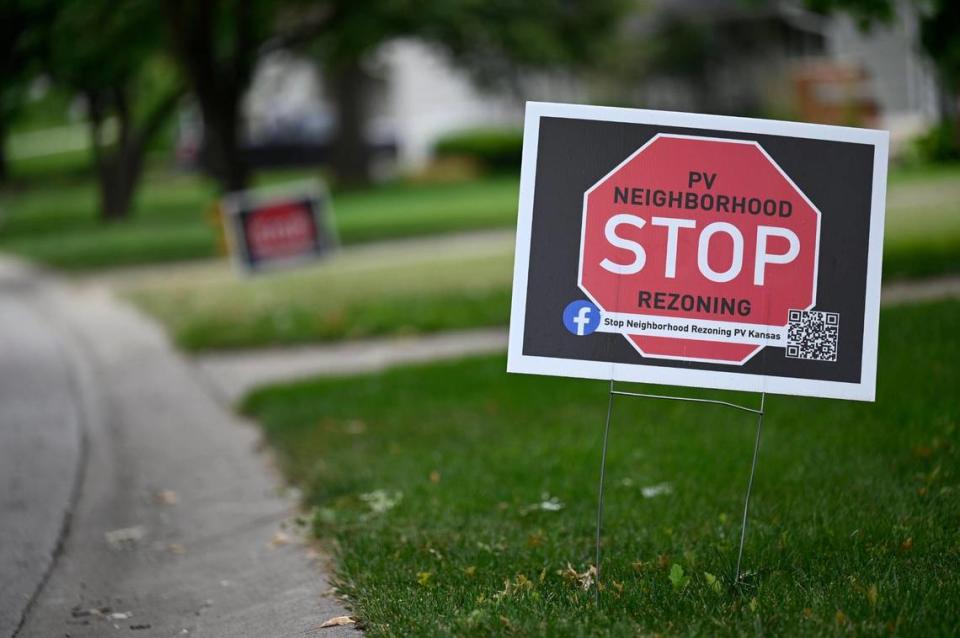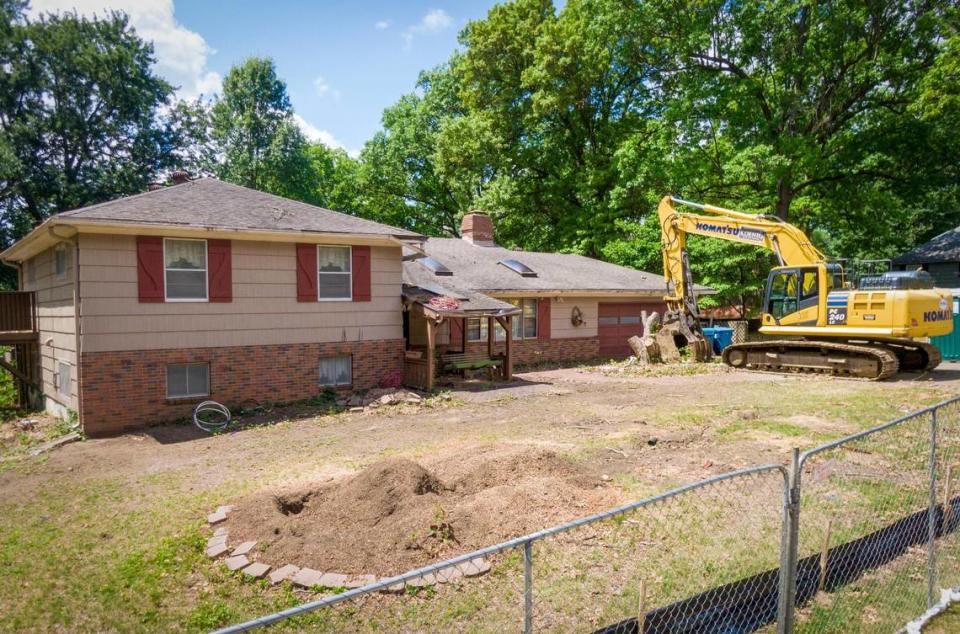Prairie Village residents mad over housing try to remake council. Do they have a chance?
Johnson County’s election office is reviewing three petitions — aiming to overturn Prairie Village’s form of government and remove half of the City Council — to determine whether they can legally be placed on the November ballot.
But Prairie Village’s city attorney said during the council’s standing-room-only meeting Monday that the petitions failed to meet several legal requirements, signaling they are likely to go nowhere.
A vocal group of residents organized over the past year to oppose the city’s efforts to allow for more affordable housing. The “Stop Rezoning” group has been collecting signatures on petitions to limit rezoning, strip the mayor of powers and halve the 12-member council. The six members elected in 2021 would automatically be ejected from their seats.
Johnson County’s legal counsel determined earlier this spring that the group’s petitions failed to meet legal requirements. But after collecting enough signatures, the group — through attorney Rex Sharp, husband of council candidate Lori Sharp — submitted three of their ballot initiatives to the city and county election office last week.
“The Johnson County legal department raised several compliance questions ... about noncompliance with Kansas law,” Prairie Village Mayor Eric Mikkelson said during the meeting. “It’s unclear whether those legal compliance problems were shared with prospective (petition) signers. But upon first review, it appears those issues may not have been addressed.”
Members of the opposition group still are urging officials to let the initiatives be decided by the voters this fall. They came out in force to voice anger and disappointment with city leaders during Monday’s meeting.
“Thousands of homeowners have spoken. Are you still not listening?” resident Pam Justus said.
Resident Karen Gibbons argued that the initiatives would put Prairie Village in line with the “norm” of other cities with smaller councils. Prairie Village does have a large council for its size, with the same number of members as in Overland Park and Kansas City.
Gibbons pushed back against those who call the initiatives to remake the city government “radical.”
She said the “Stop” group has been called, “old, racist, NIMBYs, trolls, liars. Do you wonder now, while we have massive support from Prairie Village residents and just months before the election, we do not believe what you say? You’ve changed your attack, your spin and your purpose numerous times over the year that I’ve been actively watching. We do not believe you will back away from your original plans.”
Some council members said members of the group spread misinformation and failed to disclose the language of the petitions as they were being circulated. And some called the effort to overturn the city’s government and remove council members from their seats midterm “unconstitutional.”
Councilman Greg Shelton, elected in 2021, argued that either the group misunderstands the law and is “over-promising” to petition signers, or has “co-opted the housing initiative as a political ploy to sow discord and discontent in our community as a means of trying to regain some political power after their preferred candidates were defeated in the past two elections.”
“Why the sudden need for all this upheaval?” Shelton said. “Especially since so many of the leaders of the ‘Stop Prairie Village’ group actually served on this council and never felt compelled to pursue similar measures while they sat in these seats.”

Housing war in Prairie Village
Red “Stop Rezoning” signs have been cropping up in yards across Prairie Village over the past year, as the council has debated whether it should change zoning laws to allow for more affordable housing.
Officials argue Prairie Village needs a more diverse housing stock, in the city where average home prices topped $536,000 last year, and where smaller homes keep getting torn down to make way for McMansions. They say current zoning laws largely prohibit the construction of duplexes, triplexes, row houses and small apartment buildings, or basically anything other than single-family homes and large apartment complexes.
As the city prices out many working- and middle-class families and retirees, some feel it is time that Prairie Village does something to ensure housing is available for teachers, police officers, firefighters and others who work in the city. Last summer, the council voted to support the city housing committee’s recommendations, which included amending zoning regulations.
But that has set off a firestorm in the northeast Johnson County city of 23,000, with several homeowners opposing any zoning changes that could possibly lead to developers building higher-density housing. Many joined the “Stop” group, which includes some former council members and current candidates. Members argue the city is already too dense and built out to add multi-family housing they worry would ruin the character of their neighborhoods.
Homeowner James McGrath told The Star in an email that the zoning changes would be “developer friendly and will allow outside interests, not neighbors, to come in and build without considering neighbors’ and the community’s interests. More multifamily will just increase density to an already fully built city.”
City leaders have slowed their discussions as neighbors raise more concerns. And the council voted to mostly take single-family areas out of the discussion, and focus on allowing mixed-use projects in zoning areas with multi-family and commercial space.
But the “Stop” group has been unimpressed, arguing on Monday that if the city had addressed their concerns they wouldn’t be packing the council chambers. Some said the city should be more focused on making Prairie Village more affordable for current homeowners.
Now the housing debate has morphed into a full-blown political battle over how the city government is run.

Effort to overhaul Prairie Village
The “Stop” group submitted its three petitions to the city and county election office last week.
One would change the city’s definition of rezoning and restrict ordinances that would allow for accessory dwelling units, or “granny flats,” as well as other dwellings with more than one family living on a single-family lot. City code currently allows for those “granny flats” but only if they are attached to the main house and follow other strict regulations. Officials have debated amending those restrictions.
More than 3,700 people signed that petition, according to a letter to the county from Rex Sharp.
The second petition would abandon the city’s mayor-council form of government, including cutting the number of council seats in half and removing all of the members elected in 2021. And the third would establish a mayor-council-city manager form of government that would limit the mayor’s powers and have only one council member per ward.
Those petitions both had more than 2,100 signatures, according to the letter.
“The mayor and current council are elected to represent their residents. They clearly aren’t listening to the hundreds of people that have attended the meetings, written emails and spoken at meetings,” McGrath said in an email. “All these residents just want to be heard and have a say. That is why the petitions are so important, to let the citizens have a say/vote. I would hope they would be in support of that and eager to hear from the residents.”
In addition to having enough signatures, the initiatives must meet several requirements under state law to be valid and placed on the ballot.
Prairie Village City Attorney David Waters said the petitions do not fix the problems raised by the county this spring, when the group submitted five initiatives for review, and legal staff said they did not meet statutory requirements.
Councilman Chad Herring questioned that during Monday’s council meeting.
“Why would people bring before us petitions that they expect are going to be illegal, or at least considered to be so, if not to try to raise ire against this council? When we … have an obligation to follow the constitution of the state of Kansas and follow the law,” Herring said. “We’re not permitted to advance illegal matters.
“I think the answer is there’s a desire to increase anger at the elected officials of the city.”
Herring, who was elected in 2019, called efforts to “undermine” the 2021 election, “unreasonable, unconstitutional and probably illegal.”
Waters said there are several legal problems with the petitions, including missing language required under state law that says the person circulating a petition must believe each signature is genuine. Waters said that by omitting the language, there is no verification that the person signing it is who they say they are.
And signatures could be invalidated, he said, if residents signed a blank page missing the required language.
Another simple error is that state law requires the petitions to include the language, “Shall the following be adopted?” But the group failed to add that sentence to the petitions regarding the form of government.
Both Waters and the county legal department also disagree with having two separate petitions, one abandoning the form of government and another establishing a new one. If one passes and another doesn’t, Waters said this could produce conflicting election results.
Waters said state law also requires that if a new form of government were to pass, the governing body would be elected under that structure at the next regular city election, which would be in 2025. But the group’s petitions call for half of the council to immediately be removed. Only the six who win in November would be in office.
He said the petitions also should establish terms of office. But the initiatives only state that the “currently elected at large Mayor shall serve two year terms.” Waters said the petition does not establish the terms of office for future mayors.
Mikkelson ran unopposed for mayor last year. Earlier this summer, Johnson County District Attorney Steve Howe rejected four requests to recall Mikkelson, partly because the mayor sits on the board of United Community Services, which promotes affordable housing solutions. Howe determined the requests had no legal grounds.
Councilman Ron Nelson, who was elected in 2021, argued, “there are other reasons behind this movement, as it seems not to be anything about the petitions, because the petitions are not well written.
“The petitions have not been shared. … If you want to run against somebody, then you run against them. You don’t do it the chicken way and then file a petition after somebody’s been elected to either remove them from office or just take out six of us.”
Some city officials said that if residents are interested in changing Prairie Village’s form of government, there are more productive ways to have that discussion. Waters pointed to Lawrence, where the city formed a task force to study the form of government and is putting the matter on the ballot.
Johnson County Election Commissioner Fred Sherman will review the legality of the petitions, but Waters said the timeframe for that is unclear. Sherman previously told The Star that ballot language must be approved by Sept. 1 for the November election.

